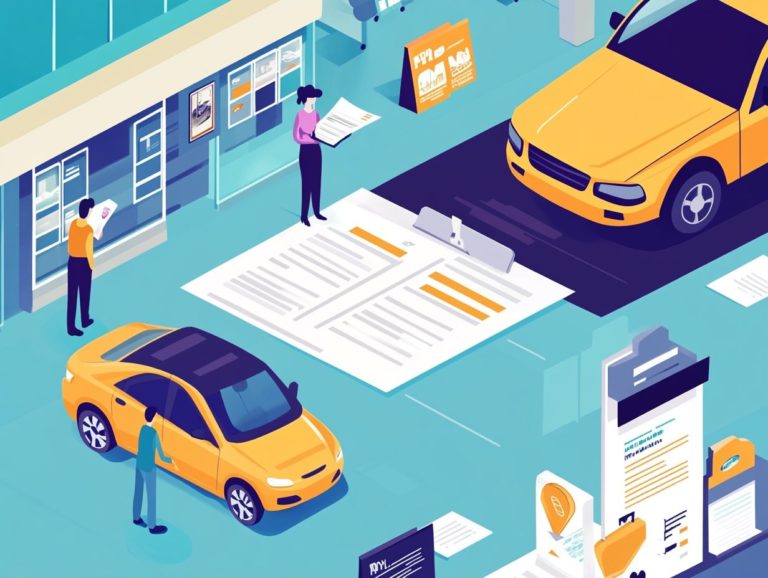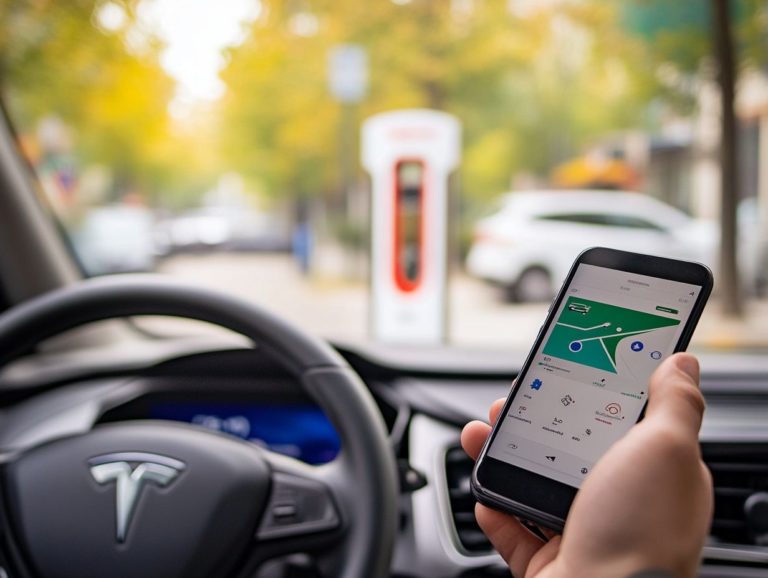5 Simple Steps to Financing Your Dream Car
Financing a car can seem daunting, but it doesn’t have to be. Whether you’re considering a sleek new model or a dependable used vehicle, understanding the financing process is essential for making a wise investment.
This guide lays out five straightforward steps to help you secure the best deal on your dream car. From determining your budget to exploring financing options and negotiating a fair price, you’ll discover valuable insights along the way.
It also covers common pitfalls and weighs the pros and cons of leasing versus buying. Ready to take the plunge? Let s dive in!
Contents
- Key Takeaways:
- 1. Determine Your Budget
- 2. Research Different Financing Options
- 3. Get Pre-Approved for a Loan
- 4. Negotiate the Best Deal
- 5. Finalize the Financing and Purchase
- What Are the Different Types of Car Financing?
- Frequently Asked Questions
- What are the 5 simple steps to financing my dream car?
- How can I determine my budget for financing my dream car?
- What financing options are available for my dream car?
- Should I get pre-approved for a loan when financing a dream car?
- What factors should I consider when selecting the right car to finance?
- How can I negotiate the financing terms for my dream car?
Key Takeaways:

Determine your budget before starting your search for a dream car to avoid overspending.
Research and compare different financing options to find the best deal for your budget and needs.
Getting pre-approved for a loan can increase your chances of securing a good car loan and simplify the purchasing process.
1. Determine Your Budget
Determining your budget is an essential first step in the car purchasing journey. This crucial task allows you to pinpoint your dream car or that luxury vehicle you’ve been considering, all while staying within your financial boundaries. You may also want to consider the financing options available to make the most informed decision.
Good financial planning should encompass down payments, monthly expenses, and the overall costs of ownership. To assess your financial landscape, dive deep into your savings accounts. It s vital to ensure you have sufficient funds reserved for those unexpected expenses.
Figuring out all the costs of owning a car including insurance, maintenance, and fuel will give you a comprehensive view of what to expect in terms of ongoing liabilities. Utilizing budgeting spreadsheets can make this entire process significantly smoother. These structured templates help you track your income and expenses with ease.
Don’t forget to factor in your credit score as part of your financial strategy. A healthy credit score can open the door to better financing options. Additionally, following the 5 steps to successful car negotiation will help you secure the best deal. By noting your monthly expenses alongside your car budget, you’ll be in a much better position to avoid any financial strain down the road.
2. Research Different Financing Options
Researching various financing options is crucial for you to make an informed decision when purchasing your vehicle. It gives you the power to compare auto loans, dealership financing, and credit union offerings, enabling you to find the best interest rates and loan terms tailored to your financial situation.
In today s market, you have a wealth of choices that can align perfectly with your financial goals and preferences. Dealership financing often provides convenience and attractive promotional rates, while credit union loans frequently boast competitive rates thanks to lower overhead costs.
Personal loans also present an appealing avenue for financing, granting you greater flexibility. It s vital for you to evaluate not only the interest rates but also the loan terms, as these can impact your monthly payments and overall affordability.
Understanding the car’s residual value is also important, ensuring that any potential depreciation fits seamlessly into your financial strategy.
3. Get Pre-Approved for a Loan
Getting pre-approved for a loan is an essential step in your purchasing journey. It not only clarifies your budget but also enhances your negotiating power by showcasing your financial stability and solid credit score to potential lenders and dealerships.
This process typically requires you to submit key documentation, such as proof of income, tax returns, and details of current debts. This information allows lenders to gain a comprehensive understanding of your financial situation.
It’s important to recognize that your credit history significantly influences loan approval; a higher credit score often results in more favorable interest rates and terms.
By obtaining pre-approval, you ll also gain a clearer view of what you can afford, allowing you to shop with confidence. This pre-approval serves as a valuable leverage point during negotiations, potentially unlocking superior deals that may elude others who aren’t financially prepared.
Act now to secure the best rates!
4. Negotiate the Best Deal

Negotiating the best deal for your vehicle is an art form that demands strategic consideration of several factors, including the dealership’s reputation, trade-in value, and a solid understanding of the financing options available to secure a favorable purchase agreement.
You should prioritize thorough research on the dealership’s history and customer reviews. These insights are invaluable in assessing their reliability and service quality.
Regarding trade-in value, knowing the market worth of your current vehicle will greatly enhance your leverage during negotiations.
Understanding the various financing choices, whether loans or leasing options, gives you the power to secure optimal interest rates and payment plans. Additionally, consider 5 tips for financing a salvage title vehicle and monitor economic factors like current interest rates and regional demand for vehicles, as these can greatly influence negotiations.
Staying informed about market trends while negotiating is essential for achieving the best possible outcome.
5. Finalize the Financing and Purchase
Finalizing the financing and purchase of your vehicle represents the peak of your work. It requires meticulous attention to the purchase agreement.
It s essential to ensure that every aspect of your financial planning is in order, including auto financing and future ownership costs, such as insurance payments and vehicle registration.
To facilitate a seamless transition into vehicle ownership, take the time to thoroughly review the purchase agreement for any discrepancies or terms that could impact your financial obligations. Grasping the total cost of ownership taxes, fees, and interest on financing is vital.
After confirming all the details, the next step is to set up auto insurance. This not only safeguards your vehicle but is often a prerequisite for financing approval.
With the insurance in place and the registration process completed, your vehicle will be ready for the road. Now, you can focus on the thrill of owning your new ride!
What Are the Different Types of Car Financing?
Understanding the various types of car financing is crucial for making an informed decision. You have options like top financing options for first-time car buyers:
- Auto loans
- Personal loans
- Dealership financing
- Leasing
Each financing method has unique characteristics that can significantly shape your buying experience. For example, auto loans typically boast lower interest rates compared to personal loans, making them a favored choice for those wanting to purchase a vehicle outright.
On the flip side, dealership financing might come with enticing incentives, but beware higher rates and hidden fees can lurk in the shadows. Leasing could offer you lower monthly payments, but it may not suit everyone, especially if you plan to keep the vehicle for the long haul.
By carefully evaluating factors like interest rates, payment structures, and your overall budget, you can navigate your options more effectively and discover the financing solution that aligns perfectly with your unique circumstances.
What Factors Should Be Considered When Determining a Budget for a Car?
When determining your budget for a car, it’s essential to consider several critical factors. It’s not just about the upfront costs, like the down payment (the initial amount you pay upfront); you also need to account for ongoing monthly expenses, maintenance costs, and insurance payments.
These ongoing expenses can significantly impact your financial health if you don t estimate them accurately. Maintenance costs covering everything from routine servicing to unexpected repairs and potential replacements should definitely be part of your monthly budget to avoid any unpleasant surprises.
Insurance premiums also deserve your attention, as they can vary widely based on coverage levels and your driving history. Researching and comparing rates is vital to find the best fit for your needs.
By incorporating these elements into your overall budgeting strategy, you can work more effectively toward your savings goals, ensuring that you remain financially stable while enjoying the rewards of car ownership.
How Can One Improve Their Chances of Getting a Good Car Loan?

Improving your credit score stands out as one of the most effective strategies for increasing your chances of securing a favorable car loan. Lenders often scrutinize credit history and financial stability when determining loan approval and setting interest rates.
By actively managing your debt keeping credit card balances low and making timely payments you can steadily boost your score. It’s essential to regularly check your credit reports for inaccuracies or unfamiliar information, as errors can adversely affect your credit ratings.
Understanding economic factors like interest rate trends and the overall lending landscape empowers you to negotiate more favorable loan terms. Being well-informed about these elements helps you secure a loan and ensures you can make sound financial decisions in the future.
What Are Some Tips for Negotiating a Car Deal?
Negotiating a car deal might seem a bit daunting at first, but don’t worry! With the right strategies in your toolkit like researching dealership reputations and exploring various financing options you can significantly boost your chances of securing a favorable purchase agreement.
Before you dive into negotiations, thorough preparation is crucial. Gather information about the market value of the vehicle you desire, along with any available incentives or promotions that could sweeten the deal.
Pay close attention to essential financing terms such as interest rates, loan duration, and monthly payments, as these factors can profoundly influence the total cost. Being well-informed about economic factors gives you an edge during negotiations.
For example, if interest rates are low, highlighting your budget might prompt the seller to enhance their offer. Ultimately, being well-informed empowers you to negotiate with confidence and effectiveness.
What Are the Pros and Cons of Leasing vs. Buying a Car?
Leasing versus buying a car brings with it a unique set of advantages and disadvantages. With leasing, you often enjoy lower monthly payments and a smaller upfront financial commitment, while buying leads to long-term ownership and the potential for building equity the value of the car that you own outright.
When weighing these options, consider how each aligns with your personal financial goals. Leasing allows you to drive a brand-new model every few years without the hassle of dealing with a sale when the lease ends though, let s be honest, you won t have an asset to show for all those payments.
On the flip side, buying a vehicle might mean higher initial costs and maintenance down the road, but it grants you full ownership and the chance to reap potential resale value. If long-term financial security is your priority, you might find buying the more appealing route.
If you prefer lower short-term costs, leasing could be a better option.
What Are Some Common Mistakes to Avoid When Financing a Car?
Watch out for these common mistakes that can harm your finances. Failing to assess your credit score, underestimating the total cost of ownership, or neglecting to research the dealership’s reputation before sealing the deal can all lead to regret down the line. To avoid these pitfalls, consider exploring 5 ways to save on auto financing costs.
Many individuals also overlook how loan terms can affect their finances, mistakenly believing that longer repayment periods always result in lower monthly payments. This assumption can lead to a surprising amount of interest accumulating over time.
Be wary of add-ons that dealerships promote, as these can inflate your costs. By taking the time to recognize and understand these pitfalls, you can make informed decisions that support your financial health, ensuring that your new purchase meets both your immediate needs and aligns with your long-term budget.
Frequently Asked Questions

What are the 5 simple steps to financing my dream car?
The 5 steps to take before financing a car are: determine your budget, research financing options, get pre-approved for a loan, find the right car, and negotiate the financing terms.
How can I determine my budget for financing my dream car?
Start by reviewing your finances and expenses. To make informed decisions, consider the 5 things to know about car financing in 2024 and decide how much you can comfortably spend on monthly car payments.
Don t forget to include extra costs like insurance, maintenance, and fuel.
What financing options are available for my dream car?
Common options include bank loans, credit union loans, dealership financing, and online lenders. To make an informed choice, understand how to finance your new car purchase and compare these options to find the best deal that fits your budget.
Should I get pre-approved for a loan when financing a dream car?
While it s not required, getting pre-approved can be incredibly beneficial. It helps you understand your budget and the financing terms available to you.
This knowledge can strengthen your position when negotiating with the dealership.
What factors should I consider when selecting the right car to finance?
Consider your budget and personal preferences, such as fuel efficiency and the car’s history. Always test drive the car and have it inspected by a mechanic before making a decision.
How can I negotiate the financing terms for my dream car?
Research your options and know your budget and credit score before negotiating. Be ready to walk away if the terms aren’t favorable.
Negotiate for a lower interest rate, longer loan term, or additional perks like free maintenance or an extended warranty.






